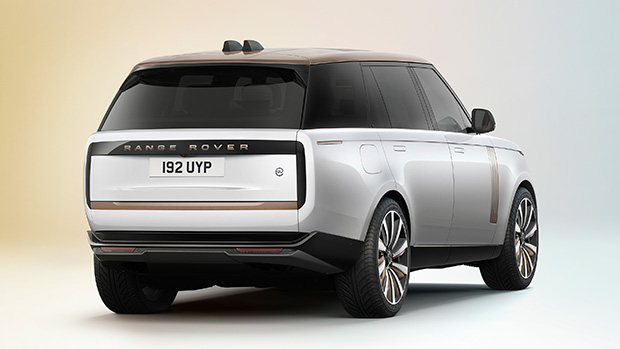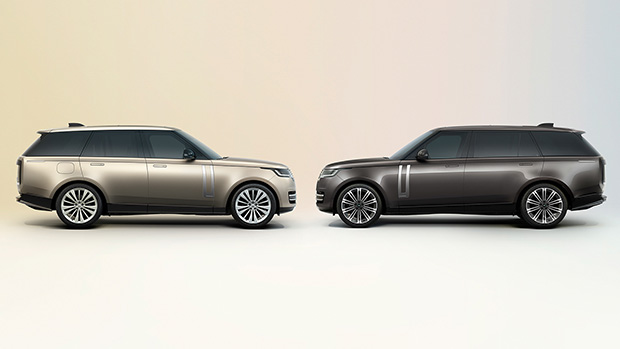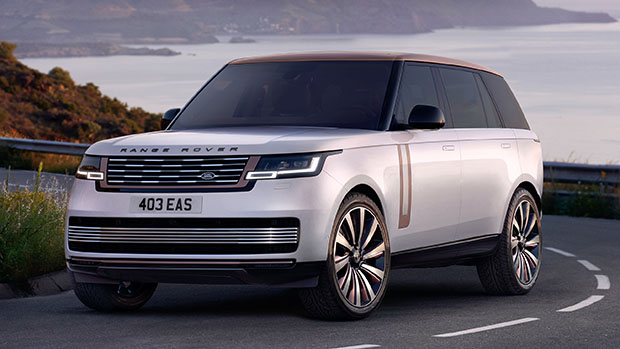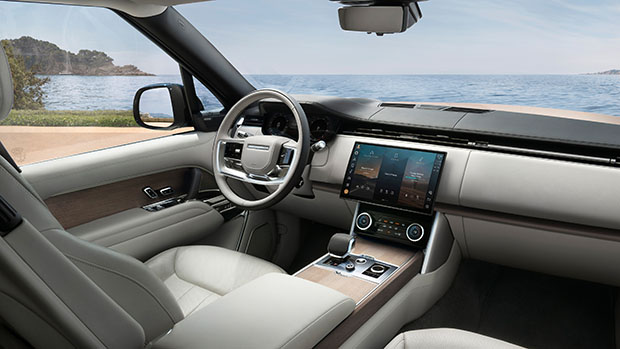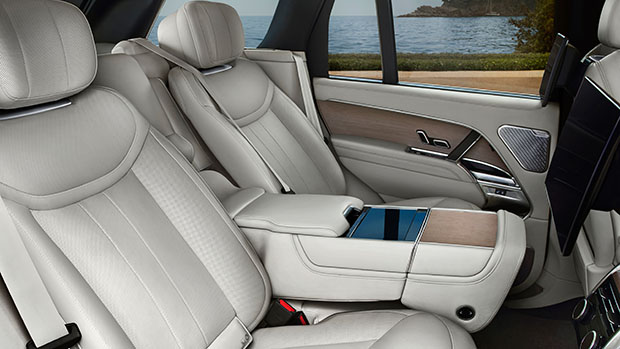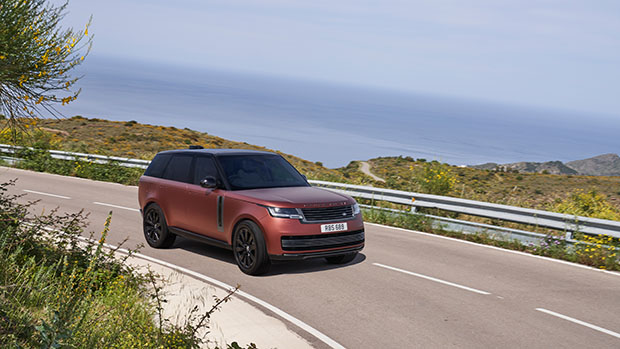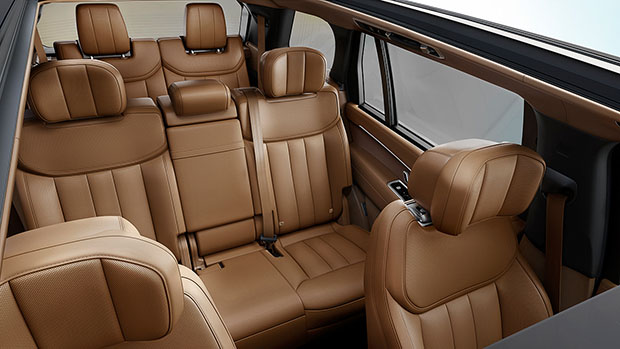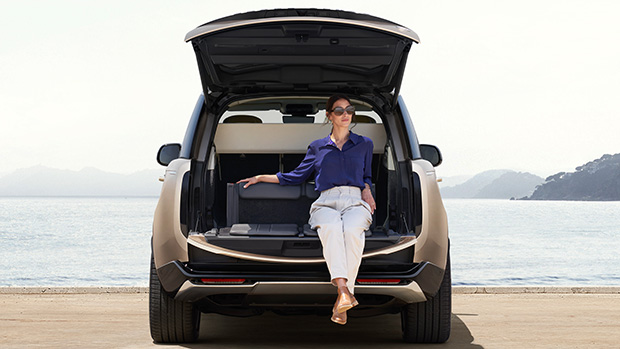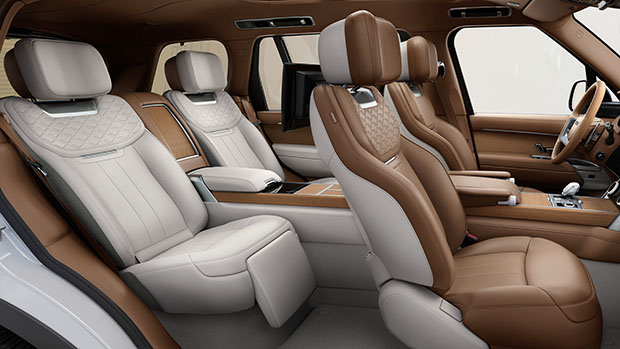-
Car Reviews
- Car News
-
Car Comparisons
Latest comparisons
- Chasing Deals
Kicking off with a 12-model line-up, the fifth-generation Range Rover aims to be many things to the well-heeled clientele able to afford its exquisitely engineered, beautifully styled magnificence
If you’re interested in the first all-new Range Rover since 2012, and only the fifth since the world’s first luxury off-roader made its debut back in 1970, then now is your chance to start counting those pennies!
Officially unveiled overnight to global media, Australian orders for the fifth-generation Range Rover (dubbed L460) open tomorrow – Thursday 28 October – for the core 12-model line-up, with customer deliveries scheduled to start in June 2022.
Initially consisting of four trim levels, four powertrains, two wheelbases and three seating configurations (four-, five- or seven-seat), the L460 Range Rover line-up will further expand later in 2022 with two more variants – a new six-cylinder plug-in hybrid model and a flagship variant simply called Range Rover SV, before an all-electric Range Rover hits the road in 2024.
We’ve covered the new Range Rover plug in hybrid extensively in another article, as well as the exhaustive engineering and design that headlines this Range Rover for the 2020s.
Australian orders for the forthcoming Range Rover plug-in hybrid and Range Rover SV will officially open on 27 January 2022, with deliveries expected some time during the second half of next year.
As for the fifth-gen Range Rover models you will be able to order from this Thursday, here’s what to expect:
Priced from $220,200 (before on-road costs) for the D300 diesel and $225,500 (before on-road costs) for the P400 petrol, the Range Rover SE will be short-wheelbase only and the sole variant available with the entry-level 3.0-litre mild-hybrid twin-turbo-diesel six-cylinder engine.
Producing 221kW of power and 650Nm of torque, the D300 is good for 0-100km/h in 6.9sec, an 80-120km/h rolling acceleration time of 5.1sec and a top speed of 218km/h.
The D300’s official combined fuel consumption figure is 7.2L/100km.
If you’d prefer petrol power in your Range Rover SE, the P400 features a 3.0-litre mild-hybrid turbocharged and supercharged six-cylinder engine good for 294kW of power and 550Nm of torque.
Land Rover says the SE P400 is capable of 0-100km/h in 5.8sec, an 80-120km/h rolling acceleration time of 3.7sec and a top speed of 242km/h. Its official combined fuel consumption figure is 9.1L/100km.
Like every L460 Range Rover model, both SE variants feature an eight-speed automatic transmission with two-speed transfer case, adaptive air suspension and rear-axle steering.
Headline equipment inclusions consist of a fixed panoramic roof with electric sunblind, pixel LED headlights with washers and LED tail-lights with sequential indicators, 21-inch alloy wheels with a full-size spare, Nickel Atlas exterior pack, keyless entry, electric tailgate with gesture control, an electrically adjustable steering column, wireless phone charging, 20-way heated electric front seats, brown walnut-veneer trim, extended leather interior, three-zone climate control and a 15-speaker, 400-watt Meridian sound system.
Moving one rung up the L460 Range Rover hierarchy unlocks a higher-output D350 six-cylinder diesel ($241,400) and a new P530 twin-turbo V8 petrol ($259,500).
The D350 diesel engine shares the D300’s hardware but increases outputs to 258kW and 700Nm – enough to lower its 0-100km/h time to 6.1sec, improve its 80-120km/h rolling acceleration time to 4.4sec and lift its top speed to 234km/h.
Official combined fuel consumption for the D350 is identical at 7.2L/100km.
As for the P530 petrol V8, it’s now a 4.4-litre twin-turbo BMW unit, replacing the former 5.0-litre supercharged V8 in the Range Rover line-up.
Producing 390kW of power and a solid 750Nm of torque, the P530 can sprint to 100km/h in 4.6sec, dispatch 80-120km/h in just 2.9sec and reach an electronically limited top speed of 250km/h.
Its combined fuel consumption of 11.8L/100km is claimed to be 16 percent better than that of the L405-series Range Rover P525 it replaces, featuring Jaguar Land Rover’s well-liked but ageing 386kW/625Nm 5.0-litre supercharged V8.
Over and above the SE, the Range Rover HSE scores digital LED head-lights with image projection, 22-inch alloy wheels with full-size spare, illuminated seatbelt buckles, front seat ventilation and rear seat heating/ventilation, a ‘ClearSight’ digital interior rear-view mirror, Cabin Air Purification Pro and a 19-speaker, 800-watt Meridian 3D surround-sound system.
Reportedly accounting for around 20 percent of total Range Rover sales, the Autobiography marks where the new L460 Range Rover line-up starts to spread its wings.
It shares the HSE’s drivetrain offerings – D350 twin-turbo-diesel six-cylinder and P530 twin-turbo-petrol V8 – but is available in both short-wheelbase, long-wheelbase, and seven-seat long-wheelbase versions.
The short wheelbase models carry a significant price premium over the HSE – $279,600 (before on-road costs) for the D350 HSE and $297,600 (before on-road costs) for the P530 HSE.
Opting for a 200mm-longer wheelbase increases the price by $5500 for both drivetrains – $285,100 (before on-road costs) for the D350 Autobiography LWB and $303,100 (before on-road costs) for the P530 Autobiography LWB.
Adding third-row seating further increases the price of each LWB model by another $1500.
Autobiography inclusions beyond the HSE span configurable drive programs, black-painted brake calipers, a sliding panoramic roof, Autobiography exterior pack, laminated front and rear side glass, solar windscreen, 22-inch diamond-turned alloys with gloss dark-grey contrast, and 24-way heated and cooled massage electric front seats with ‘Executive Class’ rear seats.
Additional cabin features include SV Bespoke natural brown walnut veneer, a heated steering wheel, illuminated metal treadplates, SV Bespoke full extended leather upgrade, duo-tone leather headlining, rear side sunblinds, four-zone climate control, auto-folding luggage cover, Versatile Loadspace floor and a 35-speaker, 1600-watt Meridian Signature sound system with active noise cancellation and second-row seat-back speakers.
Offered only in traditional short-wheelbase form and with the same drivetrains as the HSE and Autobiography, the range-topping (until the SV arrives) First Edition model will be produced for the first 12 months of the L460 Range Rover’s life.
Starting at $298,800 (before on-road costs) for the D350 six-cylinder diesel and $312,500 (before on-road costs) for the P530 petrol V8, the First Edition is loaded with much of the equipment people would love to add to any L460 Range Rover including all the Autobiography’s gear as well as rear privacy glass, unique Sunset Gold satin-finish paint (for $17,000 extra!), 23-inch multi-spoke alloy wheel with full-size spare, natural Ecru walnut veneer with First Edition script, a front centre console with refrigerator and ‘Tailgate Event Suite’ (which we covered in our 7-best Range Rover design features) which brings the outdoor party to the L460’s split tailgate.
With deliveries not scheduled until the second half of next year, the Range Rover SV’s Australian spec is yet to be revealed, though the UK specification suggests it will truly be a large luxury SUV to match (or exceed) almost any limousine that less than a million can buy.
Headlining its ultra-plush interior is a four-seat ‘SV Signature Suite’ option that combines over a metre of rear legroom in the long-wheelbase version with a pair of individual rear seats that must surely rival first-class air travel for feeling of expense, while far exceeding that standard for materials quality and range of features.
All prices listed are before on-road costs.
Latest news
About Chasing cars
Chasing Cars reviews are 100% independent.
Because we are powered by Budget Direct Insurance, we don’t receive advertising or sales revenue from car manufacturers.
We’re truly independent – giving you Australia’s best car reviews.
